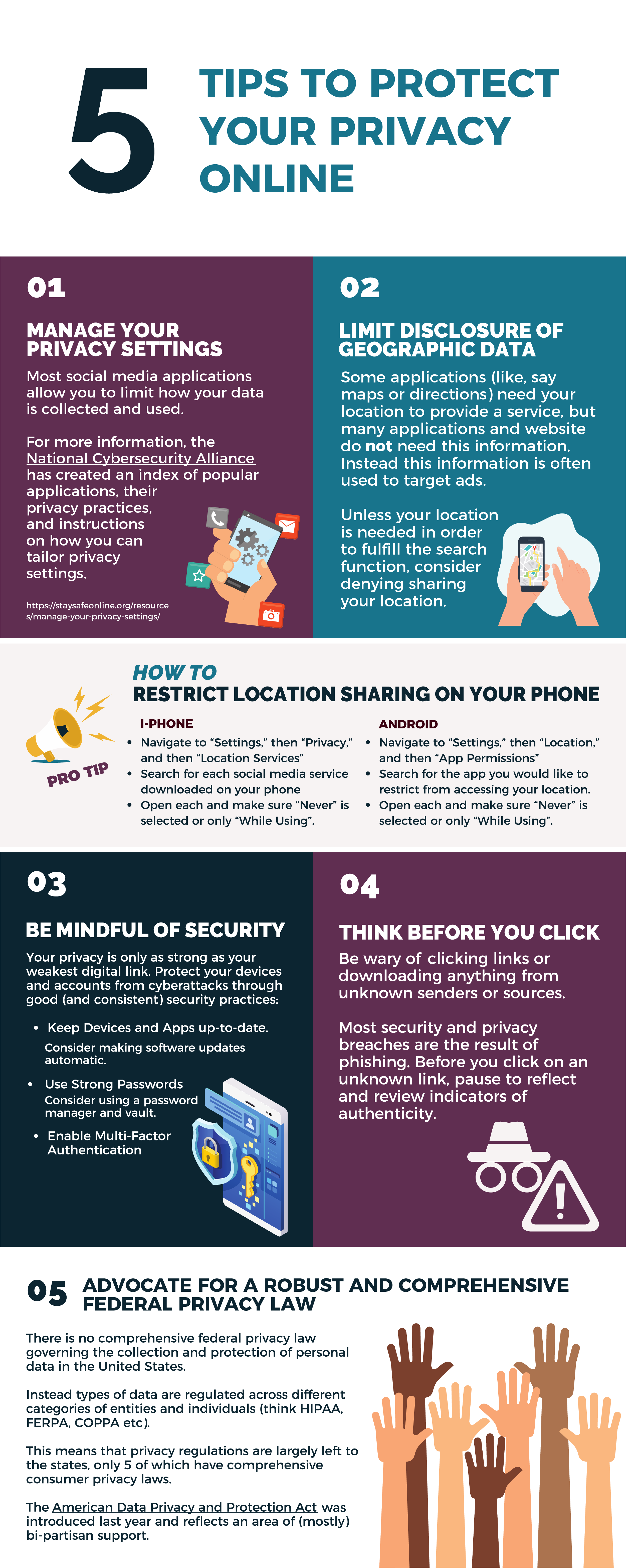For this week’s segment of Our Ideas, Principal Tina Simpson brings us five ways to protect your data and privacy on your adventures scouring the internet.
To recap the importance of this past Saturday’s holiday, Data Privacy Day, we hope these tips highlight and bring awareness about respecting privacy, safeguarding data, and how to enable trust among you and your peers.
01: Manage Your Privacy Settings
Most social media applications allow you to limit how your data is collected and used. For more information, the National Cybersecurity Alliance has created an index of popular applications, their privacy practices, and instructions on how you can tailor privacy settings.
02: Limit Disclosure of Geographic Data
Some applications (like, say maps or directions) need your location to provide a service, but many applications and website do not need this information. Instead this information is often used to target ads. Unless your location is needed in order to fulfill the search function, consider denying sharing your location.
03: Be Mindful of Security
Your privacy is only as strong as your weakest digital link. Protect your devices and accounts from cyberattacks through good (and consistent) security practices:
- Keep Devices and Apps up-to-date: Consider making software updates automatic
- Use Strong Passwords: Consider using a password manager and vault
- Enable Multi-Factor Authentication
04: Think Before You Click
Be wary of clicking links or downloading anything from unknown senders or sources. Most security and privacy breaches are the result of phishing. Before you click on an unknown link, pause to reflect and review indicators of authenticity.
05: Advocate for a Robust and Comprehensive Federal Privacy Law
- There is no comprehensive federal privacy law governing the collection and protection of personal data in the United States.
- Instead types of data are regulated across different categories of entities and individuals (think HIPAA, FERPA, COPPA etc).
- This means that privacy regulations are largely left to the states, only 5 of which have comprehensive consumer privacy laws.
- The American Data Privacy and Protection Act was introduced last year and reflects an area of (mostly) bi-partisan support.
Pro-Tip: How to Restrict Location Sharing on Your Phone
iPhone
- Navigate to “Settings,” then “Privacy,” and then “Location Services”
- Search for each social media service downloaded on your phone
- Open each and make sure “Never” is selected or only “While Using”.
Android
- Navigate to “Settings,” then “Location,” and then “App Permissions”
- Search for the app you would like to restrict from accessing your location.
- Open each and make sure “Never” is selected or only “While Using”.

We’re Experts in Digital Strategy.
In delivering security services, we provide concrete, actionable guidance to simplify the complexity of cybersecurity and privacy practices and threats. An organization must be able to adapt rapidly. This level of agility requires an organization move from cybersecurity awareness and defensive reaction to cultivating cybersecurity resilience.


